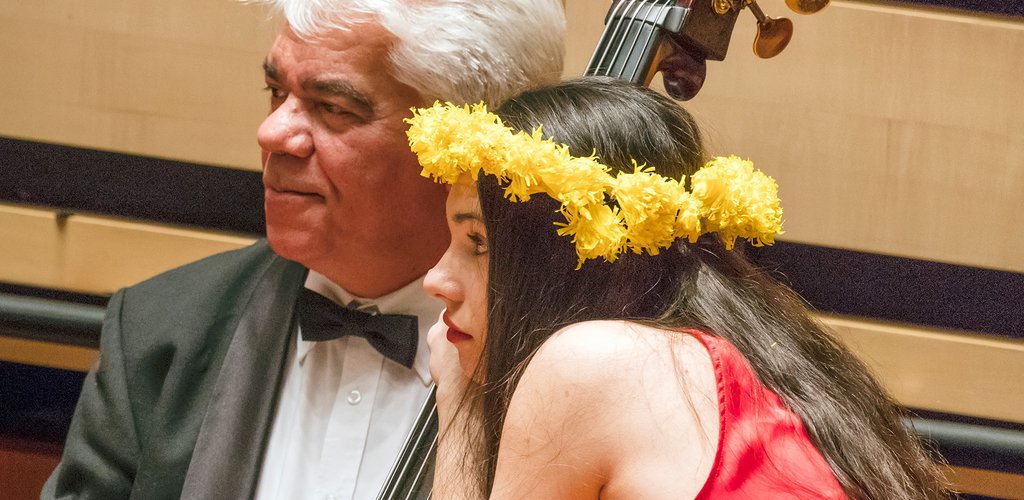The conjecture that ‘one-day festivals only climax at the end’ was shown to be untrue from the very first concert of the Schumann- Mendelssohn Marathon. The audience erupted in applause for the opening concert, after the world-famous violinist Kristóf Baráti and the Franz Liszt Chamber Orchestra played Mendelssohn’s Symphony for Strings in B minor and his Violin Concerto in D minor. When not playing a solo, Baráti inadvertently began to conduct, sometimes unconsciously making signals with his bow or hand.
Despite all my benevolence, it was difficult to ease into the concert by the students of the Liszt Ferenc Academy of Music. They are skilled and talented, but following Baráti would always be risky. Besides their Schumann piano concert, the Academy students also performed for free in the Glass Hall during the major concerts.
A feature of these Marathons is that the Festival Orchestra gives its members the opportunity to perform in chamber formations. During Schumann’s Märchenerzählungen and Octet, I kept thinking that there is a reason these artists are members of an orchestra and not soloists.
It is pleasant to immerse yourself in 12 hours of German romantic music, but it would certainly be more convenient if we didn’t constantly have to keep dashing between the Béla Bartók National Concert Hall and the Festival Theatre. It was only possible to have lunch during the single longer break. Some were eating out of Tupperware boxes, while others were on the lookout for a few bites at the venue.
Not everybody wanted to be present at all 11 concerts; many were satisfied with 2 or 3. And the further we went, the younger the audience got.
The selection was thrilling, not only because it was the first time since the first Müpa Marathon in 2008 that two composers were represented, but also because the cream of the crop performed one after another. A great number of people probably became Zoltán Fejérvári fans during his concert with the Budapest Strings, expanded with a wind section and conducted by János Kovács, as he played such piano solos that the audience did not want to let him go home. Dénes Várjon’s concert was also a fantastic experience; he played a solo Mendelssohn piano piece and a four-hand work alongside Izabella Simon.
Another prime-time concert featured Zoltán Kocsis and the Hungarian National Philharmonic Orchestra. It is difficult to imagine the situation whereby the two founders of the Festival Orchestra, who have mostly avoided one-another for decades due to artistic differences, agreed on the programme selection of Kocsis’s orchestra for the Marathon. But the main thing was that they performed.
Once again this year, the greatest miracle was the closing concert; a joint production by the Budapest Festival Orchestra, the sophomore class of the University of Theatre and Film, and the Pro Musica Girls’ Choir. There were queues at the entrance to the main hall . Fischer and his associates combined Mendelssohn’s music and Shakespeare’s play to produce an hour-and-a-half rendition of A Midsummer Night’s Dream. Actors in red costumes moved among the musicians, occasionally engaging with them. Two horns formed Bottom’s donkey ears, a violin’s bow became a sword and a few times they borrowed Iván Fischer’s baton; when not conducting, he sat on the pulpit and obviously enjoyed the show.
After this concentrated music, I was curious to see what I might have missed that Sunday, and took a look on Facebook. The first post I ran into (by Ágnes Merényi, editor-in-chief at Cartaphilus Publishing House) nailed my feelings perfectly. “I think that during tonight’s Festival Orchestra performance of A Midsummer Night’s Dream, Shakespeare was sitting next to Mendelssohn, smiling to himself and nibbling at his moustache with great satisfaction.” She wrote. “I think I saw him in the corner.”
The curious fall flat on their faces
Tickets for the Marathon went on sale on 4 November. The Kristóf Baráti and the Franz Liszt Chamber Orchestra concert in the Béla Bartók National Concert Hall, as well as the duo by Dénes Várjon and Izabella Simon in the Festival Theatre, sold out within 48 hours. Not long after that, there were no tickets available for either the concerts by the Hungarian National Philharmonic Orchestra nor by the Budapest Festival Orchestra. During the Marathon, several people complained that it had been impossible to get into the concert by Barnabás Kelemen, Katalin Kokas, László Fenyő and José Gallardo.
READ THE ORIGINAL ARTICLE IN NÉPSZABADSÁG (IN HUNGARIAN).


